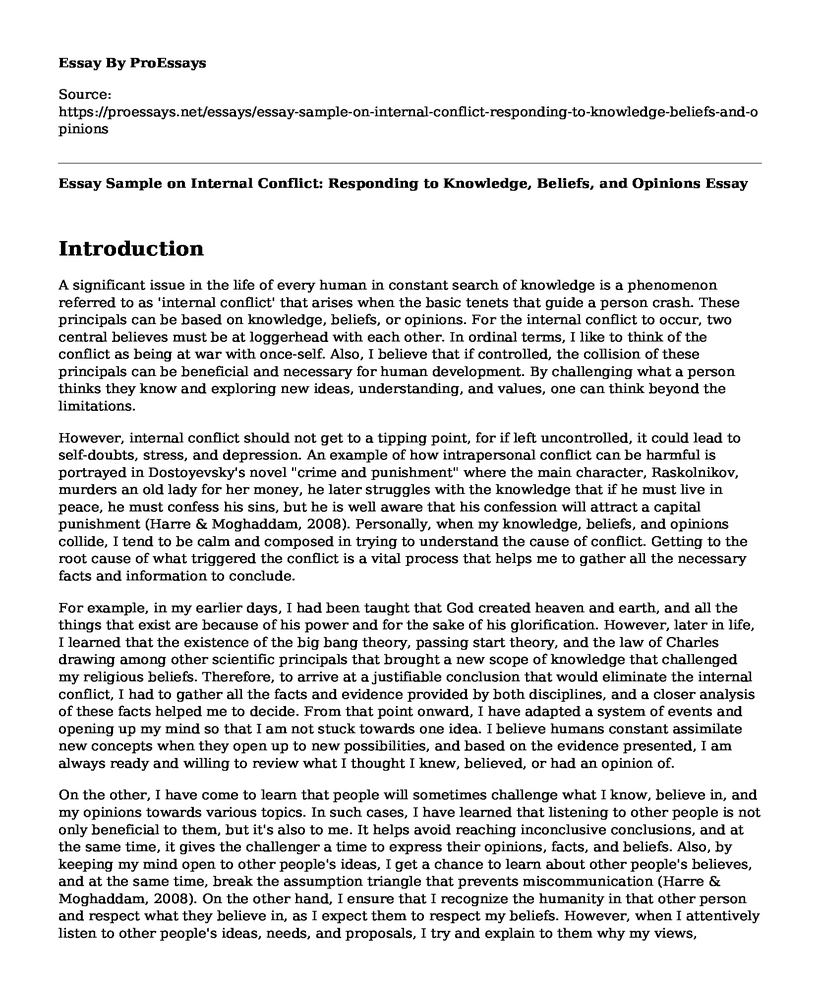Introduction
A significant issue in the life of every human in constant search of knowledge is a phenomenon referred to as 'internal conflict' that arises when the basic tenets that guide a person crash. These principals can be based on knowledge, beliefs, or opinions. For the internal conflict to occur, two central believes must be at loggerhead with each other. In ordinal terms, I like to think of the conflict as being at war with once-self. Also, I believe that if controlled, the collision of these principals can be beneficial and necessary for human development. By challenging what a person thinks they know and exploring new ideas, understanding, and values, one can think beyond the limitations.
However, internal conflict should not get to a tipping point, for if left uncontrolled, it could lead to self-doubts, stress, and depression. An example of how intrapersonal conflict can be harmful is portrayed in Dostoyevsky's novel "crime and punishment" where the main character, Raskolnikov, murders an old lady for her money, he later struggles with the knowledge that if he must live in peace, he must confess his sins, but he is well aware that his confession will attract a capital punishment (Harre & Moghaddam, 2008). Personally, when my knowledge, beliefs, and opinions collide, I tend to be calm and composed in trying to understand the cause of conflict. Getting to the root cause of what triggered the conflict is a vital process that helps me to gather all the necessary facts and information to conclude.
For example, in my earlier days, I had been taught that God created heaven and earth, and all the things that exist are because of his power and for the sake of his glorification. However, later in life, I learned that the existence of the big bang theory, passing start theory, and the law of Charles drawing among other scientific principals that brought a new scope of knowledge that challenged my religious beliefs. Therefore, to arrive at a justifiable conclusion that would eliminate the internal conflict, I had to gather all the facts and evidence provided by both disciplines, and a closer analysis of these facts helped me to decide. From that point onward, I have adapted a system of events and opening up my mind so that I am not stuck towards one idea. I believe humans constant assimilate new concepts when they open up to new possibilities, and based on the evidence presented, I am always ready and willing to review what I thought I knew, believed, or had an opinion of.
On the other, I have come to learn that people will sometimes challenge what I know, believe in, and my opinions towards various topics. In such cases, I have learned that listening to other people is not only beneficial to them, but it's also to me. It helps avoid reaching inconclusive conclusions, and at the same time, it gives the challenger a time to express their opinions, facts, and beliefs. Also, by keeping my mind open to other people's ideas, I get a chance to learn about other people's believes, and at the same time, break the assumption triangle that prevents miscommunication (Harre & Moghaddam, 2008). On the other hand, I ensure that I recognize the humanity in that other person and respect what they believe in, as I expect them to respect my beliefs. However, when I attentively listen to other people's ideas, needs, and proposals, I try and explain to them why my views, opinions, and knowledge are inclined towards a particular area. I state my reasons briefly while avoiding loaded words that embrace honesty and disclosing of my feelings.
Conclusion
In conclusion, resolving intrapersonal conflicts requires a high level of interpersonal skills. One must be willing to open their minds to new possibilities, be a good listener and curios to establish facts, and patient enough not to jump into a premature conclusion. I believe that these conflicts are normal and healthy for any person who is committed to learning. If one does not challenge what they think they know, they can never learn new things. To bring this triangle of assumptions, it is vital to explore a possibility that every new idea might have some truth to it, and unless the facts are reviewed, one can never be indeed at peace within themselves.
References
Harre, R., & Moghaddam, F. M. (2008). Intrapersonal Conflict. Global Conflict Resolution Through Positioning Analysis, 65-78. doi:10.1007/978-0-387-72112-5_4
Cite this page
Essay Sample on Internal Conflict: Responding to Knowledge, Beliefs, and Opinions. (2023, Feb 27). Retrieved from https://proessays.net/essays/essay-sample-on-internal-conflict-responding-to-knowledge-beliefs-and-opinions
If you are the original author of this essay and no longer wish to have it published on the ProEssays website, please click below to request its removal:
- Essay Sample on Professionalism in School and Workplace
- Views on Career Essay
- OSHA Standards Essay Example
- Clinical Supervisors' Ethical and Professional Identity Behaviors Essay Example
- Essay Sample on 21st Century Businesses: Corporate Social Responsibility & Corporate Citizenship
- Essay Sample on Counselors: Ethical & Legal Challenges Affecting Client Relationships
- Motivational Theories & Positive Org. Behavior: Thriving in the '90s - Essay Sample







